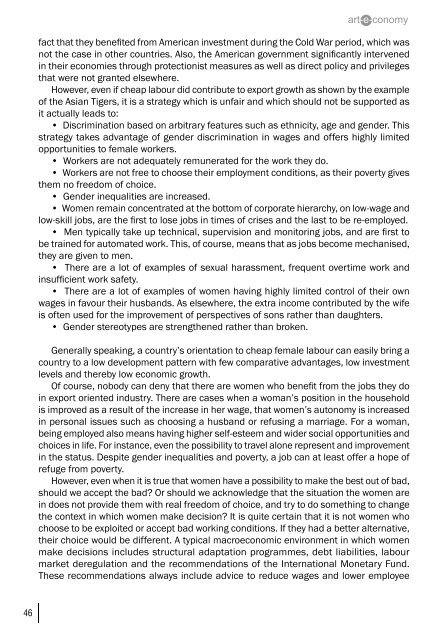art-e-conomy _ reader - marko stamenkovic
art-e-conomy _ reader - marko stamenkovic
art-e-conomy _ reader - marko stamenkovic
Create successful ePaper yourself
Turn your PDF publications into a flip-book with our unique Google optimized e-Paper software.
46<br />
fact that they benefited from American investment during the Cold War period, which was<br />
not the case in other countries. Also, the American government significantly intervened<br />
in their economies through protectionist measures as well as direct policy and privileges<br />
that were not granted elsewhere.<br />
However, even if cheap labour did contribute to export growth as shown by the example<br />
of the Asian Tigers, it is a strategy which is unfair and which should not be supported as<br />
it actually leads to:<br />
• Discrimination based on arbitrary features such as ethnicity, age and gender. This<br />
strategy takes advantage of gender discrimination in wages and offers highly limited<br />
opportunities to female workers.<br />
• Workers are not adequately remunerated for the work they do.<br />
• Workers are not free to choose their employment conditions, as their poverty gives<br />
them no freedom of choice.<br />
• Gender inequalities are increased.<br />
• Women remain concentrated at the bottom of corporate hierarchy, on low-wage and<br />
low-skill jobs, are the first to lose jobs in times of crises and the last to be re-employed.<br />
• Men typically take up technical, supervision and monitoring jobs, and are first to<br />
be trained for automated work. This, of course, means that as jobs become mechanised,<br />
they are given to men.<br />
• There are a lot of examples of sexual harassment, frequent overtime work and<br />
insufficient work safety.<br />
• There are a lot of examples of women having highly limited control of their own<br />
wages in favour their husbands. As elsewhere, the extra income contributed by the wife<br />
is often used for the improvement of perspectives of sons rather than daughters.<br />
• Gender stereotypes are strengthened rather than broken.<br />
Generally speaking, a country’s orientation to cheap female labour can easily bring a<br />
country to a low development pattern with few comparative advantages, low investment<br />
levels and thereby low economic growth.<br />
Of course, nobody can deny that there are women who benefit from the jobs they do<br />
in export oriented industry. There are cases when a woman’s position in the household<br />
is improved as a result of the increase in her wage, that women’s autonomy is increased<br />
in personal issues such as choosing a husband or refusing a marriage. For a woman,<br />
being employed also means having higher self-esteem and wider social opportunities and<br />
choices in life. For instance, even the possibility to travel alone represent and improvement<br />
in the status. Despite gender inequalities and poverty, a job can at least offer a hope of<br />
refuge from poverty.<br />
However, even when it is true that women have a possibility to make the best out of bad,<br />
should we accept the bad? Or should we acknowledge that the situation the women are<br />
in does not provide them with real freedom of choice, and try to do something to change<br />
the context in which women make decision? It is quite certain that it is not women who<br />
choose to be exploited or accept bad working conditions. If they had a better alternative,<br />
their choice would be different. A typical macroeconomic environment in which women<br />
make decisions includes structural adaptation programmes, debt liabilities, labour<br />
market deregulation and the recommendations of the International Monetary Fund.<br />
These recommendations always include advice to reduce wages and lower employee


